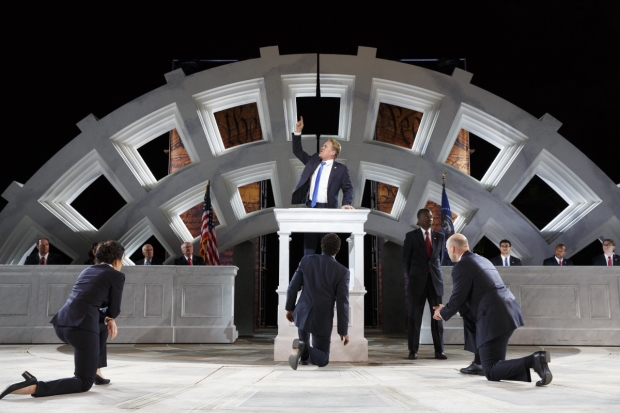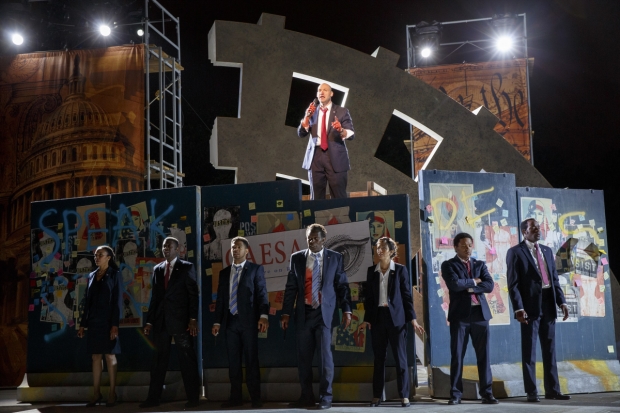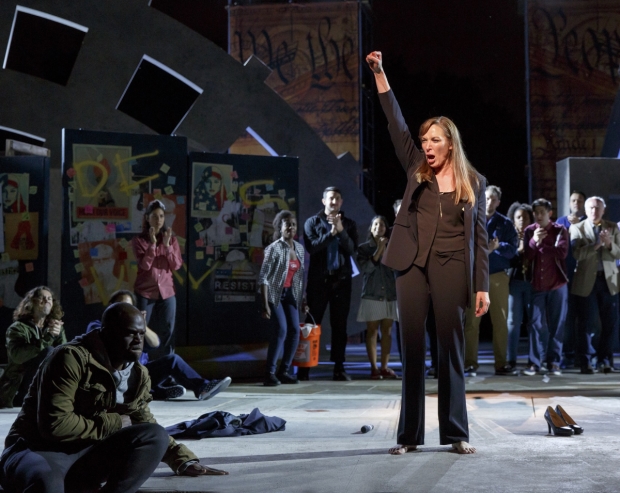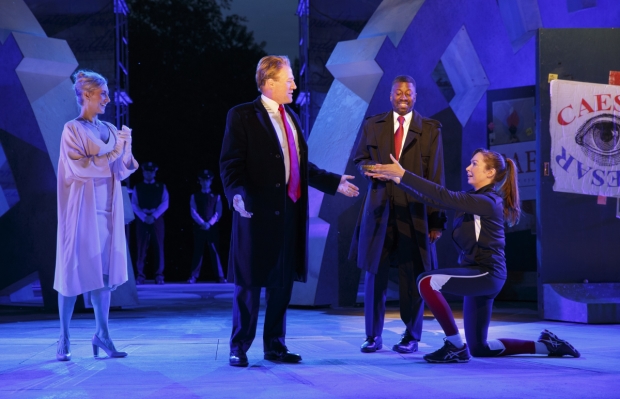Julius Caesar
A dictator seeks to make Rome great again in Shakespeare’s tragedy of power and populism.

(© Joan Marcus)
Caesar's mane defies the laws of nature: A cloud of blond hair sweeps over his head, teased toward the heavens. He wears a ridiculously long tie around his neck. He has an abrasive personality and relishes the embarrassment of patrician senators. The ancient Roman dictator looks and sounds a lot like someone we all know (but probably don't love) in the Shakespeare in the Park revival of Julius Caesar, as reimagined by Public Theater artistic director Oskar Eustis.
The play opens with Caesar (Gregg Henry) triumphant in the field of battle over his rival, Hill— …er…Pompey. With his beautiful wife, Calpurina (Tina Benko with a thick Slovenian accent), by his side and good old girl Marc Antony (Elizabeth Marvel) as his deputy, Caesar is ready to drain the swamp of Rome. This doesn't go down well with swamp-dwelling Senators Cassius (John Douglas Thompson) and Brutus (Corey Stoll). They hatch a plot to assassinate Caesar and restore the republic to liberty. But when Antony seizes upon the emotion and disorder of the moment, they discover that it is very hard to snap back to liberalism once you have embraced violent, antidemocratic methods.

(© Joan Marcus)
Detractors will undoubtedly dismiss all this as the auteurship of a bitter urban elite, licking its wounds while lobbing slings and arrows at a democratically elected leader. Still others will argue that Eustis' comparisons are too blunt, that by making Caesar all about our current politics, he undermines the universality of the story. But Shakespeare himself never shied away from thinly veiled allusions to his contemporaries: It would not have been lost on the groundlings that Caesar resembled the ambitious Earl of Essex, whose command of a loyal army made him a direct threat to Elizabethan status quo. In that sense, Eustis' heavy-handed approach is spiritually a lot closer to the original than any toga and sandals staging.
More importantly, Eustis makes his production feel exhilarating, vital, and just a bit dangerous. A giant cast of supernumeraries portrays the Roman rabble: They protest and shout all around us, creating the confusion of a raucous town hall meeting. With barbecue-glazed vocals, Marvel's magnetic Antony stirs them to a fevered pitch (I watched one man run off with an audience folding chair in a fit of rage). "No justice, no peace," the protesters chant as riot police march toward them in a phalanx (father-son fight directing team Rick and Christian Kelly-Sordelet deliver pulse-quickening segments of stage combat that will make you want to duck and cover).

(© Joan Marcus)
The lead players also make these mythic historical figures feel present and tangible: At one point, Henry's Caesar sits tweeting in an ornate bathtub, completely nude and totally pleased with himself. Thompson's Cassius is a man in a midlife crisis, torn between caution and one last fling with his youthful rebellion. Stoll brings a lawyerly air to Brutus that works particularly well with the Senator's more Jesuitical moments, like when he justifies Caesar's murder by saying, "So are we Caesar's friends, that have abridged / His time of fearing death." He'd thank you in person, if he could.
Costume designer Paul Tazewell outfits them all in an array of navy blue suits with conservative ties. The protesters sport a more casual urban look: jackets and hoodies decorated with yellow armbands that read, "resist." Jessica Paz's sound design augments the mob, with the sound of cheers and jeers penetrating the theater as if there were a giant demonstration on the great lawn. Bray Poor's dramatic and chicly modern original music is Netflix-ready. David Rockwell's set draws heavily on federal imagery: Banners featuring the capital dome and the Constitution festoon the stage. The creepy eye on the back of the one-dollar bill becomes the eye of the great leader in pro-Caesar propaganda posters. Is it any wonder that our republic, which has sought to style itself after Rome, should fit so neatly in the story of that society's descent into autocracy?
Of course, we must suspend our disbelief in important ways to fully embrace Caesar as a cautionary tale for our time: We would have to believe that our would-be strongman is clever and disciplined enough to overthrow the republic. We would have to accept that a draft-dodging coward commands an intimate knowledge of our military. And we would also have to trust that, were he to clear those two considerable hurdles, our legislators would have the courage to knife him on the Senate floor. We might as well believe in unicorns, while we're at it.

(© Joan Marcus)
The impotence of our current president matched with the grandeur of Eustisian Shakespeare leads us to think less of Trump, and more about his forebears: When Antony holds out a coronet to Caesar, we see Alexander Hamilton attempting to crown George Washington. In Antony's summary detention and execution of accused traitors, we recall Lincoln's suspension of habeas corpus. Caesar's bequest of land and money to the plebs conjures Franklin Roosevelt, expanding the welfare state while clinging to his office longer than any of his predecessors. America has faced more formidable would-be tyrants and we've survived them all. With that acknowledged, this production of Julius Caesar is oddly comforting.









